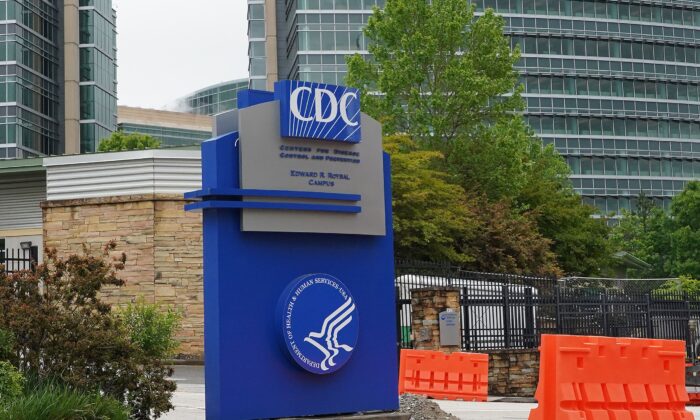U.S. Centers for Disease Control and Prevention (CDC) officials were alerted that they spread misinformation about child COVID-19 deaths but still did not issue corrections, according to emails obtained by The Epoch Times.
Drs. Katherine Fleming-Dutra and Sara Oliver were told within days of presenting to the Advisory Committee on Immunization Practices (ACIP), the CDC’s vaccine advisory panel, in June that statistics from a preprint study they shared were wrong, the emails show. But after internal discussion about how to respond, neither the CDC nor the officials corrected the false information.
Fleming-Dutra and Oliver both referenced the study, which has not been peer reviewed, while the CDC’s advisers weighed whether to recommend the agency grant emergency authorization for COVID-19 vaccines for babies and toddlers.
The committee ultimately recommended the CDC authorize Pfizer and Moderna shots for children as young as 6 months of age and the CDC quickly accepted the recommendation.
A week later, CDC Director Dr. Rochelle Walensky appeared to cite the false statistics while urging parents to get their children vaccinated, despite no evidence the vaccines protect against severe illness and despite the clinical trials returning substandard or unreliable results for shielding against infection.
Kelley Krohnert, a citizen researcher and mother who flagged the preprint, triggered the internal discussions among CDC officials, according to the emails. When Krohnert pointed Fleming-Dutra to a blog post that detailed the issues with the study, Fleming-Dutra sent the email to others, including Oliver.
“I am not sure who this should go through. Let me know what I need to do,” Fleming-Dutra said.
Megan Freedman, a CDC health communications specialist, looped in a CDC spokeswoman, and they informed Fleming-Dutra that she and other subject matter experts “would need to determine if there’s any validity to the complaint.” If the complaint was deemed valid, possible next steps might include pulling the slide or adding a footnote, Freedman said.
Oliver jumped in, saying that Krohnert “appears [redacted], but there are my thoughts.” Her thoughts were redacted.
“I’m sure you guys can make it sound prettier, but something like this would be how I would respond,” Oliver said. “And the general sentiment that ‘even 1 death from COVID that’s preventable is too many, regardless of how you count them.’”
There’s no evidence any of the COVID-19 vaccines prevent death for small children.
“Love it – thank you for sending!!!” Freedman said.
Separate Exchanges
A separate thread started after the Washington Post forwarded Krohnert’s email over a Post article that said COVID-19 is “a leading cause of death” among children. The article still links to Fleming-Dutra’s slide, which in turn referenced the preprint.
Kristen Nordlund, a CDC spokesperson, sent the email to Fleming-Dutra, who forwarded it to Oliver.
“Kristen: [redacted]. Hope that helps?” Oliver replied.
“Thanks Sara! [redacted]. And really, I think the bottom line (which lots of ACIP members said today) is any death in a child (regardless of where it ranks on a list) is one too many,” Nordlund replied.
Dr. Jeffrey Duchin, health officer in Washington state’s Seattle and King counties, sent a link to Krohnert’s blog post to Oliver, Fleming-Dutra, and two CDC advisers, Drs. Matthew Daley—who also shared the misinformation—and Grace Lee.
“Great work today, as always. No doubt you’ve seen this and similar critiques of the mortality data presented. Will there be a response from CDC?” Duchin asked.
Correction
Seth Flaxman, a professor in Oxford University’s Department of Computer Science, and other researchers corrected the preprint after Krohnert flagged the issues to them. Their paper relied on death certificate statistics from the CDC. They initially said at least 1,433 deaths among people 19 and younger in the United States were attributed to COVID-19, but acknowledged in the updated version that the number was just 1,088.
The initial version “incorrectly used” the death certificate data, the authors said.
That sent the rank of COVID-19 among causes of death for children down. For infants under 1, for instance, it went from fifth to eighth.
Months later, Fleming-Dutra’s slide remains uncorrected, and nobody at the CDC has ever publicly acknowledged sharing the misinformation.
Fleming-Dutra, Oliver, Freedman, Nordlund, Daley, and the CDC did not respond to requests for comment.
A spokesperson for Duchin’s agency told The Epoch Times via email that the CDC replied to him in June.
The CDC “noted that the ACIP considers a multitude of data points in making their recommendations, so even if this specific pre-print paper was removed from consideration, the data overwhelmingly support COVID-19 as a cause of serious disease and death in young children, and COVID vaccines as an important way to prevent this,” the spokesperson said. “These ACIP decisions are made after reviewing the totality of the data and it is never one singular data point or analysis used.”
A spokesperson for the Stanford University School of Medicine, which employs Lee, declined to comment.
Lee promoted the false statistics during a meeting in September, and the official webpage for the committee she heads still lists the uncorrected figures. A spokesperson for the panel did not return an inquiry.
The Epoch Times obtained the emails through a Freedom of Information Act request.
‘Very Strange’
The confirmation that the CDC officials were made aware of spreading misinformation but did nothing is “super frustrating,” Krohnert said.
“They had all this internal discussion about the criticism and still the CDC director gets on TV and spouts the same criticized data,” she told The Epoch Times. “And at that point, Flaxman even said he was going to be updating their report.”
None of the CDC officials have ever replied to Krohnert.
The analysis from the British researchers utilized CDC data. It took Krohnert under an hour to run the same numbers. The Epoch Times also examined the data on the CDC’s site, corroborating Krohnert’s analysis. It’s unclear why the CDC scientists didn’t do the same.
“I don’t understand why they don’t seem to know how to use their own resources,” Krohnert said. “It’s very strange.”

